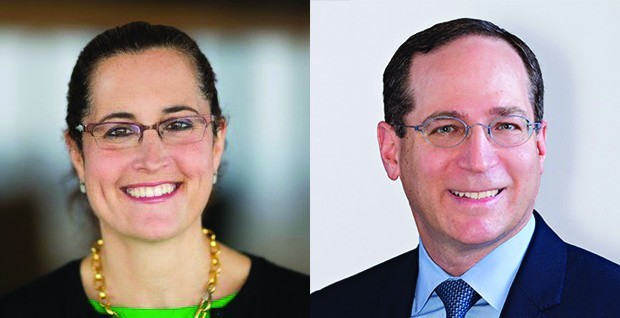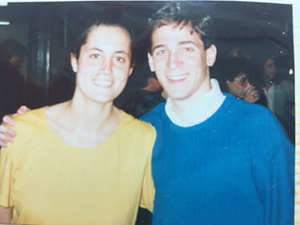Lifelong Friends and Colleagues, Lisa Carnoy and Jonathan Lavine Take the Lead in Presidential Search
For a 268-year-old institution like Columbia, three decades can seem like a blip. But for Lisa Carnoy and Jonathan Lavine, the last 30 years have represented the multifaceted journey of a true partnership, as friends and colleagues, built around shared ideals, a commitment to excellence, and, most of all, an expression of deep affection—all in service to their beloved alma mater, Columbia.
Carnoy (CC’89) and Lavine (CC’88), who became friends during their first two years as students at Columbia College, were leaders in college life. Lavine worked in Student Affairs, Carnoy on the Committee on Instruction. They did stints as resident counselors and tour guides, and both lettered in sports, Carnoy in track and field; Lavine in golf. As alumni, they would go on to serve together on the Columbia College Board of Visitors, the Capital Campaign, and, most recently, as co-chairs of the Board of Trustees.

Now, they are leading the search for the university’s next president. Carnoy, whose term as Trustees co-chair ends September 5, is chair of the Presidential Search Committee charged with managing the recruitment and assessment of candidates. Lavine is chair of the Board of Trustees, which is responsible for selecting a president from the finalists. The duo expects the search to proceed with input from across the Columbia community and with maximum transparency.
Together, Carnoy and Lavine will help the university usher in a new era. In their many Columbia roles, the duo have a proven collegiality and deep understanding of the university that may be key to finding a successor to President Lee C. Bollinger, who is stepping down after 20 years.
The ideal candidate? A person who combines the intangibles of discernment and temperament with a clear vision for the future of a great research university in a world-class city. Lavine notes that “leadership is both an art and a science,” and Carnoy points to the one thing that she never wants to change: “The brilliant, passionate, engaged students, faculty, and staff that make up our community.”
As they embark on their newest Columbia journey, Carnoy and Lavine shared a few thoughts on how they are thinking about the role and the process.
Columbia and the Future
How do you balance tradition with innovation?
Carnoy: That is the beauty of Columbia. Innovation is our tradition! Think about all of the incredible art that is created by Columbia students and grads. What about the clinical research in our labs? Just in the last few years, we have approved a new department, African American and African Diaspora Studies, and opened a new school, the Columbia Climate School. We adapted to virtual and hybrid learning in the pandemic.
Lavine: The official name of the university is Columbia University in the City of New York, but I often point out that we are not just in New York, but Columbia is of New York. That Columbia has a global impact, but never forgets its personality and responsibility, is a reflection of our inextricable link to New York City. We are more than neighbors; we are part of the community.
As you think about the next decade or so, what’s the most exciting opportunity facing the university?
Carnoy: Excellence in so many areas—from neuroscience to climate, the arts and athletics. It is not one opportunity, but rather the continued pursuit of knowledge and education and our “Fourth Purpose” of bridging scholarly knowledge and real-world action.
Lavine: We have momentum. The last 20 years have resulted in a Columbia with a global footprint and breathtaking impact. We must capitalize on that. With the opening of Manhattanville, Columbia now literally has the space it needs to allow its boundless creativity and groundbreaking research to expand and flouris
The Presidential Search
What are the key qualities for a Columbia University president?
Carnoy: It is an incredibly demanding job. Ideally, a president has a vision for the university, and can set bold goals and help advance them. They should be a scholar, someone who is known for important advances in their field of study. Someone who can attract and retain outstanding talent across myriad roles at the university, from deans to major administrative roles, faculty, etc. They should represent the university impeccably, whether among other university presidents, in New York City, or around the globe. They should be a passionate and effective fundraiser, and perhaps less “glamorous,” but an able administrator. We have operations that span basic research to clinical care, education in our classrooms, development of our physical assets, fundraising, and so on. They must love Columbia.
More About the Search
Lavine: In addition to what Lisa said, our new president needs to be passionate about the role—passionate about research, teaching, and learning. Energized by New York and focused on the unlimited possibilities of the institution. Successful Columbia presidencies are defined by a vision to challenge the boundaries of the institution, the leadership to pull the community together, the capability to drive to action, and the tenacity to get things done.
Can you imagine picking a candidate from outside of academia?
Carnoy: I doubt it, but we want to start with the largest pool of excellent candidates we can find. And I would be remiss if I didn't thank everyone who has already suggested names—and encourage everyone to continue to do so.
Lavine: While we would never say never, it seems unlikely the next president will not have some academic experience. Research and education are so fundamental to the university; it is hard to imagine someone who would both want the job and make a compelling case they could succeed, without some experience in academia.
People often criticize university presidential searches as too insular. What are your plans for running an inclusive process?
Carnoy: We aim to communicate as much as we can about the process. And have already held meetings with the executive committee of the University Senate, the Policy and Planning Committee (PPC) of the Faculty of Arts and Sciences, dozens of deans and university leaders, as well as leaders in New York City and beyond. In addition to the search committee, we will have four advisory groups representing faculty, students, staff, and alumni.
It is also worth highlighting that while we aim to communicate often, there will be periods of time when we cannot share much. As you would expect, maintaining confidentiality with the finalists will be essential to attracting the best candidates. We should assume each of our finalists is currently in an important role and would prefer not to tell their current institution until they know they have been selected.

Can you share how the Search Committee will assess candidates?
Carnoy: We will develop a set of qualifications and priorities and then a set of questions will follow. I expect that we will interview an initial set of candidates, and then spend significantly more time with our finalists, typically 4 to 5 people.
What can you tell us about the role of the Advisory committees? (faculty, students, staff, alumni, and others)
Carnoy: We are delighted to have representatives from these important groups share input on priorities for the university, qualities that are important for the next president, issues, risks, and opportunities. Our goal is to have all of our schools represented.
How will you ensure that the voices of people from across the Columbia community are heard?
Carnoy: The Advisory Committees play an important role in gathering perspectives from across the University, and we also invite everyone to complete our online survey where you can give your input anonymously if you wish. Our e-mail is presidentialsearch@columbia.edu. We have already heard from hundreds; thank you!
You mentioned good reasons for the search process to be confidential, especially regarding a candidate’s privacy. Will you offer general updates to the Columbia community?
Carnoy: Absolutely. I look forward to doing so.
An Unparalleled Opportunity
What makes Columbia special?
Lavine: There is not one standard Columbia experience. We all experience Columbia differently, and that is a great thing. Conformity is not a word you hear a lot around the university unless it is preceded with “lack of.” Also, New York City plays a role in defining everyone’s Columbia experience, which is why one often hears “Columbia is the greatest university in the greatest city in the world” when our students describe Columbia.
Carnoy: To paraphrase Herman Wouk (CC’34)—my Class Day speaker—it is the “triple magic” of the life of the mind and New York City, and our brilliant, opinionated, diverse, and brave students, faculty, staff, and community.

